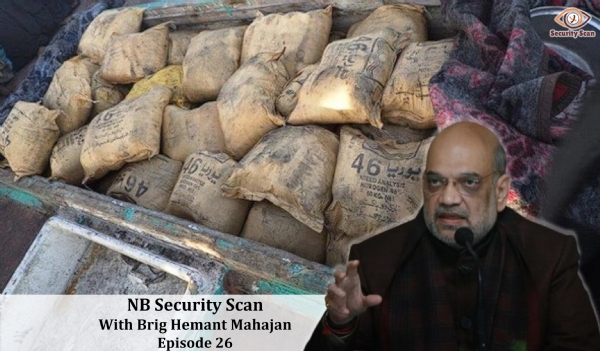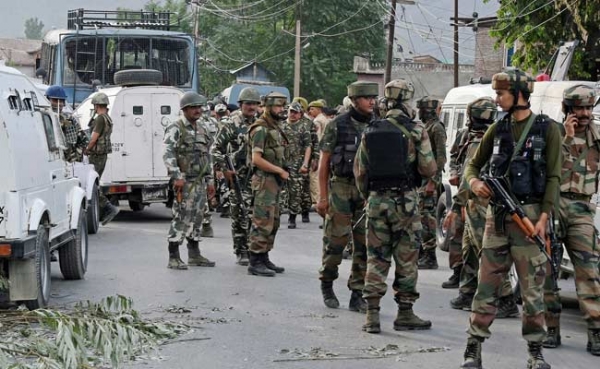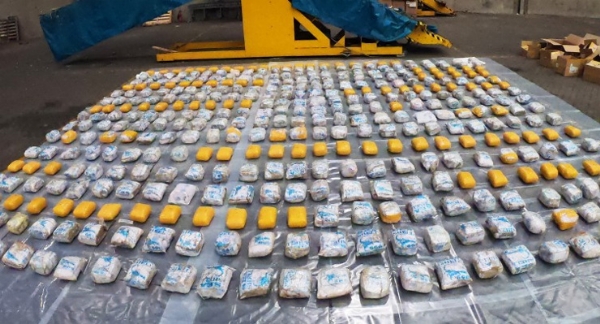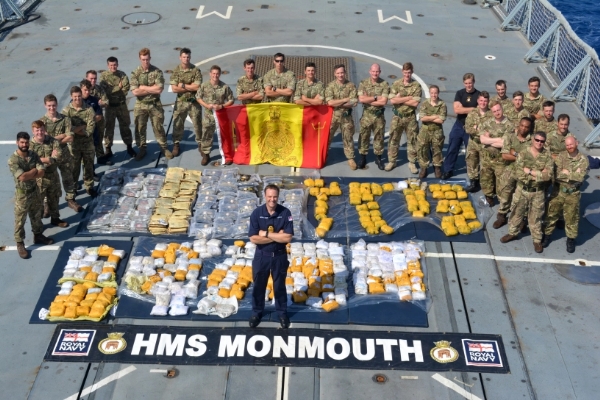#SecurityScan 26: Pakistan's low-cost Proxy War in J&K, Narco terror and more
The United Nations Security Council needs to work closer to seek accountability from Islamabad on the undeniable scourge of narco-terrorism emanating from Pakistan.
Total Views |
This article is a summary of important events that have taken place in last one week affecting, India's national security.
NEWS IN BRIEF
1. Satellite images show crowds at China’s crematoriums as covid surges.The images show a dramatic increase in activity at funeral homes, undermining Chinese claims that outbreaks are under control.

2. Chinese Influence Operations Effect Most Marginal
China's achievements may be admired, but what is unique about the Chinese model is not easily emulated -- assuming anyone wants to emulate it.
There are only four other surviving Communist states: Vietnam, Laos, North Korea and Cuba.The deep mistrust that complicates China's relationships with Vietnam and North Korea, and its ties with Laos, demonstrates that even similarity of political structures does not create influence.
It is also important to recognize that much of the gloss has worn off the Chinese model in the last decade. However successful he has been at amassing power, Xi has not proved particularly competent at governance. The unprepared abrupt shift from his zero-COVID policy to the fiasco we are now witnessing, as infections soar and medical facilities fall short, is only the latest of his missteps. It is hard to think of any of his initiatives as an unqualified success.
Returns on China's investments in influence have been most marginal where they have been most focused: Asia in general and Southeast Asia in particular."
3. Taiwan China War-
A full-scale war involving the US and Japan in the defence of Taiwan against an invasion of the island by China would involve “massive attrition” on both sides, dwarfing the scale of the war in Ukraine, a war game exercise shows.
The exercise, run by the Washington think-tank Centre for Strategic and International Studies (CSIS), is set in 2026.All scenarios start with a lightning invasion of Taiwan by China, and the assumption that the island does not quickly give up.
A hypothetical Chinese invasion of Taiwan “quickly founders” but exacts high costs on Taiwan and the US Navy, according to the results of an extensive set of war games released Monday by a Washington think tank.
Despite “massive Chinese bombardment, Taiwanese ground forces stream to the beachhead, where the invaders struggle to build up supplies and move inland” as “US submarines, bombers, and fighter aircraft, often reinforced by Japan Self-Defense Forces, rapidly cripple the Chinese amphibious fleet,” in the “most likely” scenario.
4. Chinese Bid To Dominate Container Shipping Industry-
A shipping company with deep ties to Chinese state-owned companies purchased container terminals in New York and New Jersey in December, raising serious questions about the ability and willingness of the West to counter China’s strategic capability.
China’s growing maritime commercial logistics empire poses a direct threat to the liberal international order. Beijing is building a platform for control of oceanic commerce and an amphibious invasion force that is extending the frontier of Chinese Communist Party influence all over world.
5. Japnese PM Visit to Europe-
Japanese Prime Minister Fumio Kishida is discussing security cooperation with European counterparts during his Group of Seven tour, a further sign of how shared concern about Russia and China is breaking down old geographical divisions. Kishida explained Japan's recently revised national security strategy in a meeting on Tuesday with Italian Premier Giorgia Meloni.
They agreed to elevate the countries' relationship to a strategic partnership and to hold consultations between foreign policy and defense officials.
6. Russia and Iran are working on a new shipping corridor that cuts Europe and its sanctions out of the picture, and are looking to partner with India, which has kept its distance from the Western-led isolation campaign against the two countries. Advantage India.
7. Non-residents from 10 countries will soon use UPI for fund transfer
To start with, this facility will be available to non-residents in 10 countries—Singapore, Australia, Canada, Hong Kong, Oman, Qatar, USA, Saudi Arabia, UAE and the United Kingdom.
This is a very important step to increase the reach of UPI and will make Indian economy more efficient.
8. Bengaluru set for Army Day Parade
"Karnataka became the first State to host this mega national event for the first time outside Delhi because the first Army Chief Major General K M Cariappa took command of the Indian Army from General Sir Francis Roy Bucher, the last British Commander-in-Chief in 1949, thus becoming the first Indian Commander-in-Chief post-independence.
9. Situation along Northern border stable but unpredictable: Army Chief Manoj Pande
Referring to the situation in Jammu and Kashmir, he said the ceasefire understanding that was agreed to in February 2021 is holding well. At the same time Gen Pande said cross-border support to terrorism and terror infrastructure remained. The Chief of Army Staff also said that a proposal for induction of women personnel into artillery units has been sent to the government.
INTERNAL SECURITY
Low-Cost Proxy War In J&K Will Continue
The targeted killing of Hindus in Raujori on Jan 1 that left seven innocent including women and children dead and 14 injured, has once again exposed the ugly face of Pakistan.
In an attempt to conceal involvement of existing terrorist groups in targeting Hindus, the ISI has created fake entities like United Liberation Front of Kashmir [ULFK], The Resistance Force [TRF], Kashmir Tigers [KT] and People’s Anti-Fascist Force [PAFF]. While these groups don’t physically exist, their fictitious ‘spokespersons’ promptly take responsibility for targeted killing of Hindus, migrants and other soft targets.

Pakistan based United Jihad Council head and Hizbul Mujahideen chief Syed Salahuddin in his candid admission that “we are fighting Pakistan’s war in Kashmir.” So, since it’s Kashmiris and not Pakistanis who are bearing its brunt, Pakistan is loses nothing in continuing this low-cost proxy war in J&K to bleed India through a ‘thousand cuts’.
Since domination achieved by the army in Kashmir Valley is solely due to sustained pressure on terrorists, the temptation to interpret any reduction in terrorist activity levels as an enduring phenomenon and shifting troops to South of Pir Panjal or other trouble spots on Sino-Indian border should be avoided.
Hence, instead of being unrealistic and predicting an early end to terrorism, we need to mentally attune ourselves for a long haul in Kashmir. Of course Indian army has to still shed lot of blood in Kashmir.
ENVIRONMENTAL SECURITY
Environmental considerations, must be treated seriously. No one is making an argument against development, or against building strategic and basic infrastructure and settlements and creating opportunities for livelihoods. The unfolding disaster in Joshimath, Uttarakhand, must be treated as an unequivocal warning of the perils of pursuing development that runs in the face of environmental logic and safety. The 'sinking' of Joshimath has been catapulted to the headlines, but this is no sudden calamity.
It has been a disaster in the making over decades. Only scientific studies with implementable action plan will help.
Soft Power-Using Diasporas Considerable Strength For Building India,Indian Interests Abroad
The 17th Pravasi Bharatiya Divas event, held in Indore from January 8 to 10,so that the Indians living abroad should come back and help in the development of the country with the knowledge and expertise they have acquired abroad.
Touching the heart of the issue at the 17th edition of the Pravasi Bharatiya Divas organised in Indore, Prime Minister Narendra Modi rightly said that the country’s diaspora, comprising non-resident Indians (NRIs) and people of Indian origin (PIOs) settled in different parts of the world, are our most effective brand ambassadors.
When it comes to forming their opinion of any other country, especially if they don’t have a direct connection to it through business or travel, most regular folk anywhere in the world typically picture its reality from movies, food, and the people of that nation they meet personally.
Pravasi Bharatiyas, or our people abroad, are our truest brand ambassadors, and it is important that India see this collective, individually or organised in small groups, for that profound power and purpose. And it is not just their words about India, but their own behaviour that will shape the opinion of the world about us.
During the tenure of the then Prime Minister Atal Bihari Vajpayee, an attempt was made to woo overseas Indians. Present PM makes it a point to interact with the Indians abroad. It was in 2002 that the first Pravasi Bharatiya Divas event was held in New Delhi.
Indians settled abroad, whether in the Gulf countries, the UK, the US, Canada, Australia or Singapore, have been sending money home to their families. But they have not thought that it is profitable to do business in India or invest in India. Even today, the NRIs remittances are higher than the foreign direct investment (FDI) that India is able to attract. The NRI remittances to India were $89.4 billion in 2021 and $100 billion in 2022.
It is time now to realise that we stand to gain when an Indian makes their mark globally even if they are foreign residents. While some of our NRIs have stunned the world with their achievements, it is now incumbent upon each member of that community to convey this message to the world — Indians are smart, hard working, successful, humble, kind and worthy of friendship.
Indian diaspora across the world should be seen as an extension of India, politically, culturally and treated as soft power. Time has come to use the soft power of NRIs more effectively.
EXTERNAL SECURITY - CHINESE MULTI DOMAIN WAR
Countering Narco Terror
The busting of an international drug syndicate, which was being operated from Ludhiana, proves beyond doubt that the narco menace is very serious. According to the Narcotics Control Bureau (NCB), the syndicate had links with the drug rackets unearthed in Shaheen Bagh (Delhi) and Muzaffarnagar (Uttar Pradesh) last year; its operations extended to countries in India’s neighbourhood, such as Afghanistan and Pakistan. The fact that businessmen were doubling as drug smugglers and had set up factories or laboratories in the heart of Ludhiana points to laxity on the part of the district and state-level authorities; the possibility that these traders were in league with some corrupt officials is also not ruled out.

The latest drug bust has again turned the spotlight on the ‘Golden Crescent’, a region comprising Afghanistan and Pakistan that is notorious for the production and distribution of drugs that are smuggled into India through the land and sea routes; the use of drones for the nefarious purpose has increased manifold in the past year or so in the districts of Punjab bordering Pakistan.
India was losing generations of young people because of the drug trade in countries comprising the ‘Golden Crescent’ and the ‘Golden Triangle’. Shah had referred to these sources of drugs as ‘Death Crescent and Triangle’.
Considering the vast and well-oiled network of narcotic producers, dealers and smugglers, it will be a huge challenge to stamp out the menace. India should make the most of its G20 presidency and also use other international platforms to denounce the nations that are indulging in narco-terrorism. This calls for greater alertness by BSF.
World Not able to Stop Pakistans Narco Terrorism
On 22 November 2022, the US Navy’s destroyer USS Nitze seized an estimated $20 million worth of illegal drugs from a fishing vessel while patrolling in the Gulf of Aden (Red Sea). It is well known that the interception was on the infamous “Southern Route” used by Pakistan and Iran-based drug cartels to transport large quantities of heroin, opium, and other opioids from the Makran coast of Baluchistan to pre-determined landing points on the coast of East Africa.
Over the past two years, vessels of multinational navies operating under the aegis of the US-led Combined Maritime Forces (CMF) have seized US $900 million worth of illicit narcotics while patrolling the northern Indian Ocean, the Persian Gulf and the Red Sea.
Despite the incontrovertible evidence of extensive organised criminal activity manifesting from the Makran coast, the reluctance of the international community to openly identify Pakistan as the driving force behind the heroin trade in the Indian Ocean Region (IOR) is puzzling.
Today, it is accepted that Pakistan has emerged as the world’s “Narco State”, with crimnals in Iran and Afghanistan.
Over the past three decades, Pakistan-backed organised crime syndicates spread across Asia, Africa, and Europe have created a sophisticated network of drug businesses across continents, which meet the world’s rising demand for heroin and derivates like methamphetamine (crystal meth), increasingly using the maritime routes called the “hash highways”. These highways also contribute to the unholy nexus of the illicit narcotics trade and international terrorism.

Pakistan successfully presented a façade of being a maritime security provider in the Gulf region, even as dozens of “dhows” and fishing vessels sailed unhindered from its coast, with drug cargoes destined for far-flung locations in the Indian Ocean.
Pakistani dhows with drug cargoes have been intercepted by law enforcement agencies as far south as on the Mozambican coast. A Pakistani national, suspected of running a smuggling network in southern Africa, was extradited by Mozambique to the US in 2020 to face charges of drug trafficking. Pakistani scholar Ayesha Siddiqua has also covered this aspect of the military’s links with drug trafficking in her seminal book “Military Incorporated: Inside Pakistan’s Military Economy”.
Recent investigations in India have revealed Pakistan-based drug lord Haji Salim’s sustained attempts to create an organised criminal network spread across Sri Lanka, Maldives, and India. Nine suspected Sri Lankan-origin traffickers are under investigation by India’s National Investigation Agency (NIA) for carrying narcotics substances and illegal arms on a boat near Vizhinjam Port (Kerala) in the Arabian Sea in March 2021.
The drugs were destined for Australia and Southeast Asia. There have been numerous interceptions of drug mules and boats linked to Pakistan in the Maldives. Interceptions of Pakistani-origin drug boats have been made with alarming regularity off the West Coast of India by security agencies, the most recent instance being on 26 December 2022, when a Pakistani boat carrying arms and drugs worth Indian currency 300 crores was seized in a joint operation by Indian Coast Guard and Gujarat Anti-Terrorism Squad.
Narcotics trafficking by Pakistan-based and Pakistan-backed organised criminal syndicates operating in the Indian Ocean region poses a global challenge that needs to be dealt with a firm hand by the international community, with greater scrutiny at global forums such as Financial Action Task Force (FATF). The United Nations Security Council needs to work closer to seek accountability from Islamabad on the undeniable scourge of narco-terrorism emanating from Pakistan.
The world needs to refocus its efforts to wean Pakistan away from its dangerous flirtation with narcotics and terrorism and concentrate on domestic development.
---


